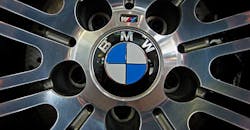BMW Sued by U.S. Diesel Drivers Over Emissions-Test Cheating
BMW AG joined the growing list of carmakers sued by U.S. drivers for installing software designed to cheat diesel-emissions tests.
Drivers of “tens of thousands” of X5 and 335D model diesel cars built between 2009 and 2011 sued BMW and its technology supplier, Robert Bosch GmbH, alleging they installed algorithms designed to manipulate testing systems, using methods similar to those Volkswagen AG admitted to.
They claim those vehicles are polluting at up to 27 times the legal limit, according to the complaint filed March 27 in New Jersey federal court.
“At these levels, these cars aren’t just dirty -- they don’t meet standards to be legally driven on U.S. streets and no one would have bought these cars if BMW had told the truth,” said Steve Berman, the plaintiffs’ attorney who has filed similar claims against Ford Motor Co., Mercedes-Benz, Fiat Chrysler Automobile NV, General Motors Co. and Volkswagen.
BMW declined to immediately comment on the lawsuit.
The German automaker largely escaped the scrutiny that has plagued the industry since VW admitted to rigging 11 million vehicles, ultimately being hit with $25 billion in fines and penalties. Then, in February, BMW said it mistakenly put the wrong software in almost 12,000 diesel vehicles. Last week, prosecutors raided the automaker’s Munich headquarters and its engine plant in Steyr, Austria, to look into 7-Series and 5-Series sedans.
BMW approached Germany’s Federal Motor Transport Authority last month after internal tests showed that the manufacturer had installed the wrong software in the cars, resulting in higher emissions.
“BMW is taking this case very seriously and is vigorously pursuing clarification on this issue,” the carmaker said at the time. “BMW continues to assume this was a mistaken allocation of software and not a targeted manipulation of emissions controls.”
In the lawsuit filed on March 27, the drivers say BMW knew exactly what it was doing by colluding with Bosch to find a way to game emissions tests, then embellishing vehicle performance to trick consumers. They accuse BMW of racketeering and corruption, along with various fraud and unfair competition practices in all 50 states.
BMW allegedly sought to enhance sales and increase its share of the U.S. diesel market but found it “impossible to achieve their goals lawfully,” according to the complaint. Instead, BMW and Bosch “resorted instead to orchestrating a fraudulent scheme and conspiracy.”
Bosch is the common thread linking the accused carmakers to the so-called defeat devices. BMW, Daimler AG and VW, along with its Audi and Porsche brands, are accused of colluding with Bosch for nearly two decades to limit technological advances in their vehicles while stifling competition.
In 2015, the U.S. Environmental Protection Agency and California Air Resources Board began subjecting diesel-powered cars and light trucks to a new battery of tests designed to root out emissions cheating in the wake of the VW scandal. That initiative led the agencies to accuse Fiat Chrysler Automobiles NV of using illegal emissions control software on diesel-powered pickups and SUVs to pass laboratory tests.
No other automaker has been formally accused of malfeasance by the agencies, but the additional scrutiny has caused some other automakers to rethink their U.S. diesel plans. Mercedes-Benz, the luxury-car unit of Daimler AG, halted efforts to win regulatory approvals for diesel-powered light vehicles last May, for example.
By Kartikay Mehrotra
About the Author
Bloomberg
Licensed content from Bloomberg, copyright 2016.
